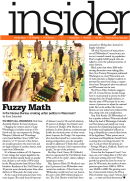Fuzzy Math: Is the Census Bureau creating unfair politics in Wisconsin?
by Evan Solochek, September 17, 2008
This article originally appeared in the print edition of Milwaukee Magazine.
 You might call Wisconsin’s 53rd State Assembly District the land of prisons. Hugging the western shore of Lake Winnebago, it includes sections of Oshkosh and also encompasses the Dodge, Waupun, Oshkosh and Winnebago correctional facilities. Some 5,000 “constituents,” or 9.5 percent of the district, are actually prisoners who don’t vote and are legal residents of another district, with many from Milwaukee.
You might call Wisconsin’s 53rd State Assembly District the land of prisons. Hugging the western shore of Lake Winnebago, it includes sections of Oshkosh and also encompasses the Dodge, Waupun, Oshkosh and Winnebago correctional facilities. Some 5,000 “constituents,” or 9.5 percent of the district, are actually prisoners who don’t vote and are legal residents of another district, with many from Milwaukee.
It’s a blatant violation of US. Supreme Court rulings that require legislative districts be divided equally based on population, declares a new study of Wisconsin by the Massachusetts-based Prison Policy Initiative. Residents of the 53rd District get 10 percent more electoral power than other districts in Wisconsin, the study notes.
At the county level, prisoners have even more impact. The study found 64 percent of Adams County’s 5th and 6th districts, 59 percent of Dodge’s 31st District and 53 percent of Dodge’s 29th District are prisoners. In these districts, constituents get double the electoral power of other voters. James Layman, the Dodge 31st supervisor, who describes himself as a conservative-leaning independent, says the inequality should be addressed. “I think that’s a false presentation because I don’t represent those people,” he says of the prisoners.
But Rep. Carol Owens (R-Oshkosh), who has represented the 53rd District since 1992, scoffs at the study’s claims, calling it “grasping at straws.”
Rep. Spencer Black (D-Madison) says that if prisoners from Milwaukee were counted as residents of their home city, “Milwaukee would have lost one Assembly seat in [the 2000 redistricting], not two. The 23rd District would have been primarily in Milwaukee. Instead it’s largely suburban.”
All told, 42 percent of state prisoners call Milwaukee County home, yet are not counted toward its population. That’s roughly 8,400 people who are tallied to serve the political interests of other districts.
Black notes that when 2000 redistricting discussions were taking place, then-Gov. Tommy Thompson petitioned Washington to count Wisconsin’s out-of-state prisoners as Badger residents to prevent this state from losing a congressional seat. Thompson’s plea was rejected and Wisconsin lost the seat.
The Prison Policy Initiative suggests the U.S. Census Bureau should change how it counts people in prison by determining their city of legal residence, or that the state of Wisconsin do its own census of prisoners to adjust the national totals. But so far, neither the Census Bureau nor any states have embraced the idea, citing costs and complications.
Rep. Fred Kessler (D-Milwaukee) offers a quicker solution: Wisconsin should follow the lead of Mississippi, Colorado and New Jersey, and simply not count prisoners for redistricting purposes. But he doubts such legislation will pass as long as Republicans control either house of the legislature. “Most prisons are in rural areas and Republicans benefit from counting the nonvoting prisoners,” he says. “Look at where the prisons are — Portage, Waupun, Oshkosh. They’re not in Democratic areas.”
Given that the Supreme Court’s “one man, one vote” ruling dates to 1963, why is this issue arising only now? Prison growth has given the issue far more impact: In Wisconsin, the number of state prisoners grew from 4,000 in 1980 to over 20,000 in 2000. The growing number of miscounted citizens, the Prison Policy Institute says, causes “serious damage … to state and local democracy.”




[…] Fuzzy Math: Is the Census Bureau creating unfair politics in Wisconsin? Milwaukee Magazine article noting the effects on electoral politics in Wisconsin, a state where “the number of state prisoners grew from 4,000 in 1980 to over 20,000 in 2000. The growing number of miscounted citizens, the Prison Policy Institute says, causes “serious damage … to state and local democracy.” […]
[…] Fuzzy Math: Is the Census Bureau creating unfair politics in Wisconsin? Milwaukee Magazine article noting the effects on electoral politics in Wisconsin, a state where “the number of state prisoners grew from 4,000 in 1980 to over 20,000 in 2000. The growing number of miscounted citizens, the Prison Policy Institute says, causes “serious damage … to state and local democracy.” […]
[…] Fuzzy Math: Is the Census Bureau creating unfair politics in Wisconsin? by Evan Solochek, Milwaukee Magazine, March 2008. […]
[…] prison-based gerrymandering skews Wisconsin’s districts on both the state and local levels, but the the effects are especially dramatic in city and county […]